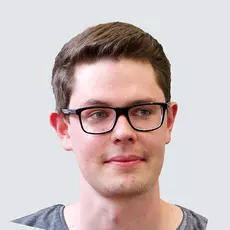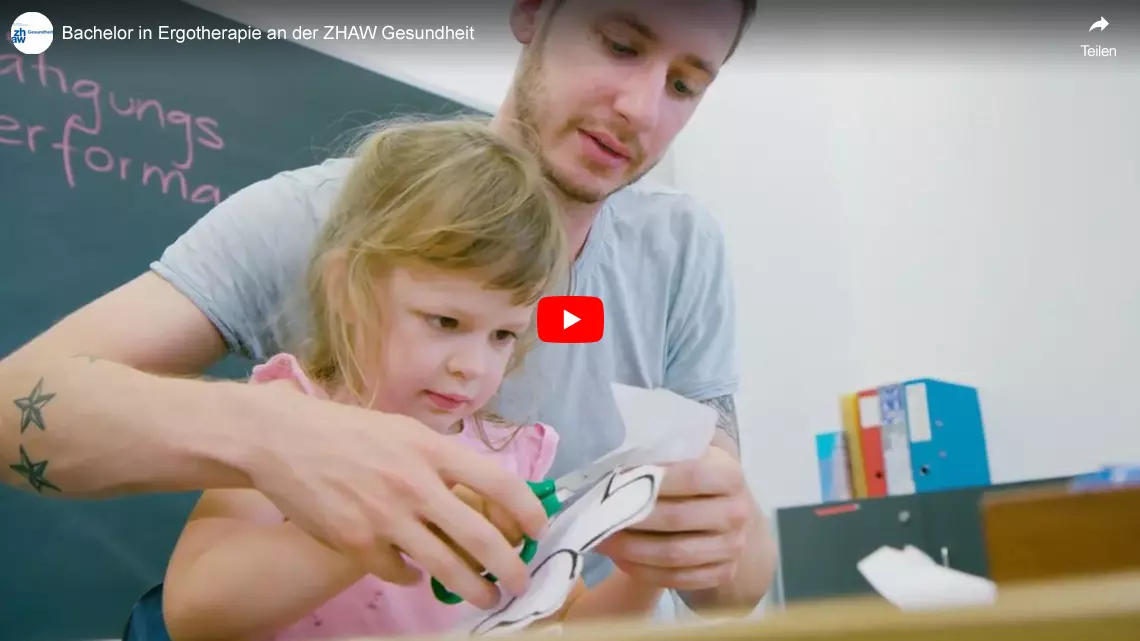Bachelor in Occupational Therapy

«Occupational therapy focuses on an individual’s ability to act. It contributes towards better health and a better quality of life. Do you want to help people to take part in society and in the activities of everyday life? If so, the Bachelor’s programme in Occupational Therapy is the right choice for you.»
Maren Kneisner, Head BSc in Occupational Therapy Programme
A practical occupational therapy programme offering a university degree and a licence to practice.
Three good reasons for studying occupational therapy at ZHAW
- We offer internationally recognised, scientifically sound and practice-oriented courses that prepare students in the best way possible for a career as an occupational therapist in the versatile and varied work environment of acute or long-term rehabilitation as well as prevention and health promotion.
- The BSc in Occupational Therapy prepares students for a smooth transition into professional life with great career opportunities. Graduates can specialise in a particular area by attending targeted academic and job-related continuing education courses.
- ZHAW is the only institution in German-speaking Switzerland that provides training for occupational therapists. It is committed to the professionalism of occupational therapy. The Institute of Occupational Therapy offers a Bachelor’s degree programme and a consecutive Master’s degree programme.
A Bachelor in Occupational Therapy
Occupational therapists support and assist people who are limited in their everyday activities due to an accident, disability, or illness. Their goal for those affected is to achieve as independent and satisfying a lifestyle as possible. For this purpose, occupational therapists analyse each individual step of an activity in their clients' everyday environment to fully understand their difficulties and strengths and, together with them, formulate therapeutic goals with individual and creative solutions.
Entry requirements for BSc in Occupational Therapy
- Baccalaureate + additional module
- Federal Specialised Baccalaureate + additional module
- Federal Vocational Baccalaureate + additional module
- Degree from a College of Higher Education and Training or another tertiary B diploma + additional module
Programme structure
This full-time course of study takes three years to complete. The career benefits for graduates are two-fold:
- a licence to practice as a fully qualified occupational therapist
- a degree from a Swiss university of applied sciences (Bachelor of Science ZHAW in Occupational Therapy)
Academic achievement is evaluated with ECTS credits (European Credit Transfer and Accumulation System), which allows for comparison across Europe. The programme is valued at 180 ECTS credits, with one credit equal to approx. 30 hours of student work.
Our Bachelor’s programme in Occupational Therapy fulfils national and international standards and educational requirements. It consists of 40 percent face-to-face classes and 60 percent self-directed study. In addition to lecture-based sessions, teaching methods promote independent and action-oriented learning (exercises, case studies, project work, workshop instruction and role playing).
Profession-specific modules
- Occupation and age: development from infancy to old age, meaning of life transitions such as puberty or retirement, typical occupations in different stages of life, concepts of occupational therapy and action as well as fundamentals in medicine, psychology and education.
- Professional context: places of work and organisational cultures, professional history, professional ethics and professional policy, healthcare and social work.
- Methodical action: learning and reflection methods, action and decision-making processes, academic writing.
- Professional specialisation: understanding, practising and applying of procedures in occupational therapy using practical case studies.
Multi-/interprofessional modules
Subjects include academic writing, communication and interprofessional collaboration as well as various multi-/interprofessional modules on aspects of society, culture and health.
Practical experience
Students complete three clinical placements (second year: 21 weeks; third year: 12 weeks) in various professional fields. In the sixth semester, they also have a project workshop (practical project with clients, 11 weeks).
Clinical placements are located all over German-speaking Switzerland and are arranged by ZHAW.
In their first year of study, students also have three three-day visits to experience different practical settings. The first three practice days focus on to children and adolescents, the second to clients in middle age and the third to clients in old age.
Bachelor’s thesis
For their Bachelor’s thesis, students work on a topic relevant to their profession and apply the scientific methods they have learned throughout their studies.

"I really enjoyed the Skills Training because we could act out real-life cases - even some with simulated patients. The project workshop was great, too: I was able to get a whole project up and running."
Mathias Giger, alumni BSc in Occupational Therapy
Professional profile and training objectives
Occupational therapists work with people of all ages in hospitals, rehabilitation centres, psychiatric clinics, care homes, special needs schools or private practice. Experienced professionals can be responsible for a team, run an entire department or their own private practice on a self-employed basis. They can also fill positions in teaching, research or in health promotion and prevention.
Competencies in seven roles
Graduates will be able to perform the varied roles that are specific to their profession competently and responsibly by applying their sound theoretical and scientific knowledge to their practical work.
- As an expert, you are committed to ensuring that people who are restricted in their everyday life can (again) carry out activities that are important to them, thus enabling them to participate in society. In doing so, you consider your clients’ cultural and social background as well as their resources.
- As a communicator, you establish a client-centred therapeutic relationship and communicate your expertise as an occupational therapist clearly and comprehensibly.
- As a collaborator, you are proactive and participate in interdisciplinary and interprofessional teams.
- As a manager, you document occupational therapy services competently and are committed to quality assurance measures.
- As a health advocate, you identify the factors that influence health, quality of life, equal treatment, accessibility, and resources at the societal and individual levels.
- As a scholar, you are committed to the development, transfer, and application of effectiveness-oriented knowledge.
- As a professional, you promote further development and professionalism in occupational therapy and are committed to competent occupational therapy practice.
At a glance
Degree: Bachelor of Science ZHAW in Occupational Therapy
Workload: 180 ECTS credits
Duration of study: 6 semesters (3 years)
Programme structure: full-time, practice-oriented Bachelor’s degree programme
Start of the course: September (Calendar week 38)
Registration deadline: January 15
Teaching location: Winterthur
Language of instruction: German
Tuition fees: CHF 720 semester fees + additional study and living expenses
Postgraduate courses: European Master of Science in Occupational Therapy
Additional information
Studying in Switzerland
Switzerland supports students from other European countries studying at the ZHAW.
International Studies
Spending a semester or a clinical placement abroad is a priceless experience for any student and offers the opportunity to learn how professions are taught and practised in other countries.
Brochure International Relations
We offer a wide range of courses for international students. Learn more about our international activities in our brochure.
Studying in Switzerland
International Studies
Brochure International Relations
Switzerland supports students from other European countries studying at the ZHAW.
Spending a semester or a clinical placement abroad is a priceless experience for any student and offers the opportunity to learn how professions are taught and practised in other countries.
We offer a wide range of courses for international students. Learn more about our international activities in our brochure.
